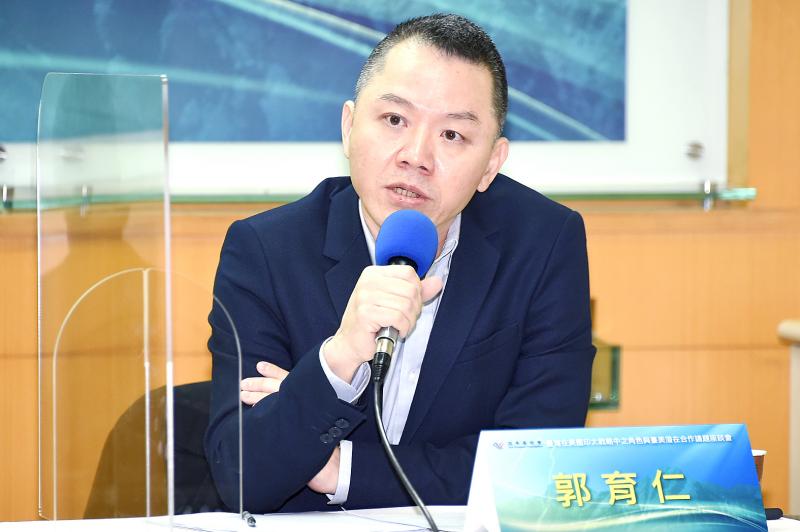The increase in Chinese military activity in and around the Taiwan Strait is meant as both a defensive measure and as a way to intimidate Taiwanese, a China researcher said on Sunday.
China’s incursions into Taiwan’s waters and airspace are meant to intimidate Taiwanese, but now they also have a defensive purpose, since the US is conducting military exercises with allies in the area between last month and September, said Kuo Yu-jen (郭育仁), a professor at National Sun Yat-sen University’s Institute of China and Asia-Pacific Studies.
The Ministry of National Defense on June 10 announced that the annual Han Kuang live-fire drills scheduled for next month are to be delayed until September due to the COVID-19 outbreak. Training of reservists has also been delayed, it announced.

Photo: Tu Chien-jung, Taipei Times
China is taking advantage of this delay to ramp up its intimidation, sending a record 28 aircraft into Taiwan’s air defense identification zone on June 15, Kuo said, adding that the exercises also made a rare incursion into airspace near Taiwan’s defenses on the east coast.
The US exercises with Japan and other allies are to take place in the East China and South China seas. China would likely respond to these exercises, but its intimidation of Taiwan would remain its main focus, Kuo said, adding that its activities near Taiwan would likely remain frequent and relatively large in scope until September.
“US President Joe Biden and Chinese President Xi Jinping [習近平] are likely to meet for the first time at the G20 summit in October,” he said.
Institute for National Defense and Security Research fellow Shu Hsiao-huang (舒孝煌) said that the increasingly complex nature of China’s drills near Taiwan is a sign of things to come.
“China’s last drills included fighter jets, bombers, early warning aircraft and transport aircraft, among others. It will likely conduct even more complex drills in the future,” Shu said.
National Chengchi University professor Hu Rui-chou (胡瑞舟) on Saturday last week said that while China is still using “gray-zone conflict” measures, such as making incursions into Taiwanese airspace, “at the same time, China is making preparations for an invasion of Taiwan, such as ramping up production of naval vessels. It’s following a set pace.”
Taiwan must prepare itself for an inevitable war with China, he said.
“To be prepared for war is the most effective way to preserve the peace,” Hu said.

Beijing could eventually see a full amphibious invasion of Taiwan as the only "prudent" way to bring about unification, the US Department of Defense said in a newly released annual report to Congress. The Pentagon's "Annual Report to Congress: Military and Security Developments Involving the People's Republic of China 2025," was in many ways similar to last year’s report but reorganized the analysis of the options China has to take over Taiwan. Generally, according to the report, Chinese leaders view the People's Liberation Army's (PLA) capabilities for a Taiwan campaign as improving, but they remain uncertain about its readiness to successfully seize

Taiwan is getting a day off on Christmas for the first time in 25 years. The change comes after opposition parties passed a law earlier this year to add or restore five public holidays, including Constitution Day, which falls on today, Dec. 25. The day marks the 1947 adoption of the constitution of the Republic of China, as the government in Taipei is formally known. Back then the Chinese Nationalist Party (KMT) governed China from Nanjing. When the KMT, now an opposition party in Taiwan, passed the legislation on holidays, it said that they would help “commemorate the history of national development.” That

Taiwan has overtaken South Korea this year in per capita income for the first time in 23 years, IMF data showed. Per capita income is a nation’s GDP divided by the total population, used to compare average wealth levels across countries. Taiwan also beat Japan this year on per capita income, after surpassing it for the first time last year, US magazine Newsweek reported yesterday. Across Asia, Taiwan ranked fourth for per capita income at US$37,827 this year due to sustained economic growth, the report said. In the top three spots were Singapore, Macau and Hong Kong, it said. South

HORROR STORIES: One victim recounted not realizing they had been stabbed and seeing people bleeding, while another recalled breaking down in tears after fleeing A man on Friday died after he tried to fight the knife-wielding suspect who went on a stabbing spree near two of Taipei’s busiest metro stations, Taipei Mayor Chiang Wan-an (蔣萬安) said. The 57-year-old man, identified by his family name, Yu (余), encountered the suspect at Exit M7 of Taipei Main Station and immediately tried to stop him, but was fatally wounded and later died, Chiang said, calling the incident “heartbreaking.” Yu’s family would receive at least NT$5 million (US$158,584) in compensation through the Taipei Rapid Transit Corp’s (TRTC) insurance coverage, he said after convening an emergency security response meeting yesterday morning. National